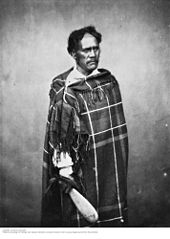
Back Rangatira Catalan Rangatira Czech Rangatira Spanish რანგატირა Georgian Rangatira NB Rangatira Polish Рангатира Russian Rangatira Swedish

In Māori culture, rangatira (Māori pronunciation: [ɾaŋatiɾa]) are tribal chiefs, the leaders (often hereditary[1]) of a hapū (subtribe or clan). Ideally, rangatira were people of great practical wisdom who held authority (mana) on behalf of the tribe and maintained boundaries between a tribe's land (Māori: rohe) and that of other tribes. Changes to land-ownership laws in the 19th century, particularly the individualisation of land title, undermined the power of rangatira, as did the widespread loss of land under the Euro-settler-oriented government of the Colony of New Zealand from 1841 onwards. The concepts of rangatira and rangatiratanga (chieftainship), however, remain strong, and a return to rangatiratanga and the uplifting of Māori by the rangatiratanga system has been widely advocated for since the Māori renaissance began c. 1970. Moana Jackson, Ranginui Walker and Tipene O'Regan figure among the most notable of these advocates.[2][need quotation to verify]
The concept of a rangatira is central to rangatiratanga—a Māori system of governance, self-determination and sovereignty.[3]
- ^
Fagan, Brian M. (26 November 1997) [1984]. "The Maori". Clash of Cultures (2 ed.). Lanham, Maryland: AltaMira Press. p. 273. ISBN 9781461666790. Retrieved 4 June 2024.
The free people of Maori society were the rangatira, almost a hereditary aristocracy.
- ^ Smith, Cherryl; Tinirau, Rāwiri; Rattray-Te Mana, Helena; Moewaka Barnes, Helen; Cormack, Donna; Fitzgerald, Eljon (2021). "Rangatiratanga: Narratives of Racism, Resistance, and Well-being" (PDF). Te Atawhai o Te Ao, Independent Māori Institute for Environment & Health. Retrieved 12 November 2022.
- ^ Smith, Cherryl; Tinirau, Rāwiri; Rattray-Te Mana, Helena; Moewaka Barnes, Helen; Cormack, Donna; Fitzgerald, Eljon (2021). "Rangatiratanga: Narratives of Racism, Resistance, and Well-being" (PDF). Te Atawhai o Te Ao, Independent Māori Institute for Environment & Health. Retrieved 12 November 2022.
Rangatiratanga is a term that encapsulates the political struggle fought by Māori to uphold sovereignty and self-determination as whānau, hapū, iwi, and as a nation. It is commonly understood as the rights that Māori 'should' have received under Te Tiriti o Waitangi.